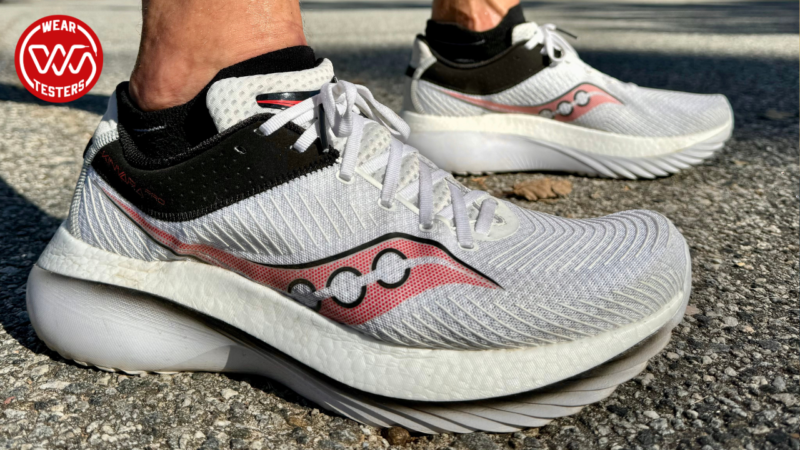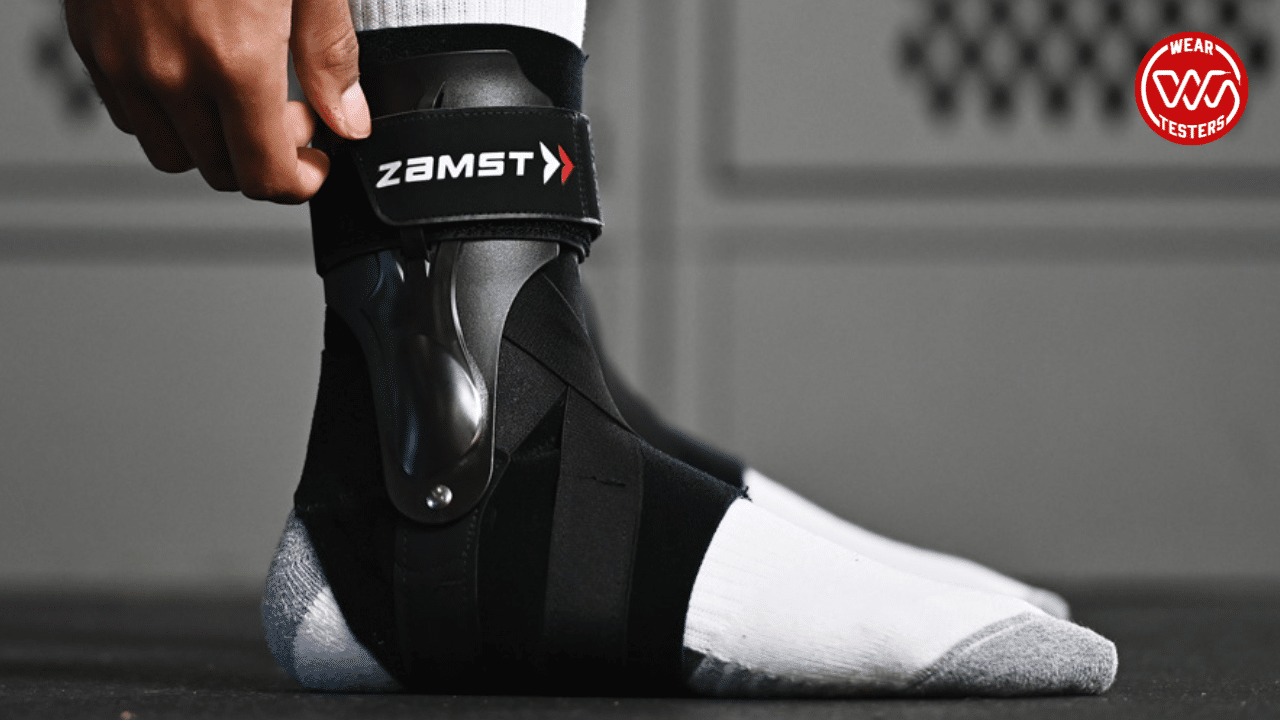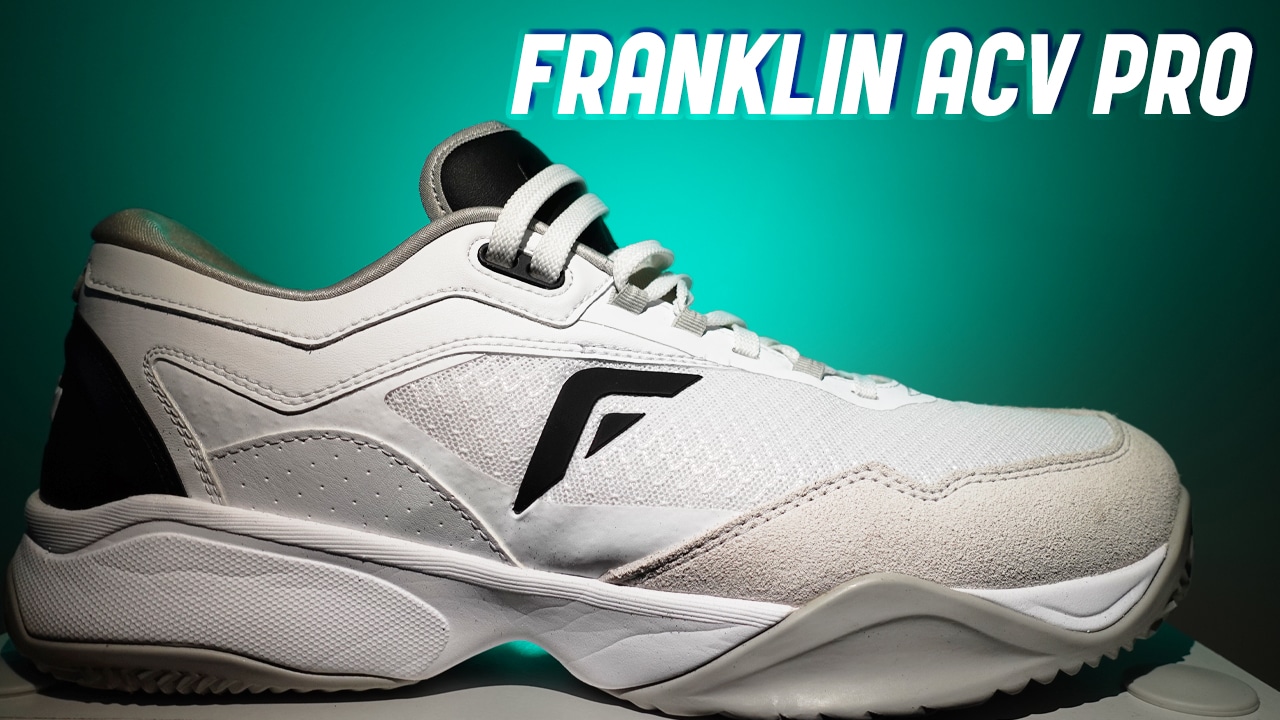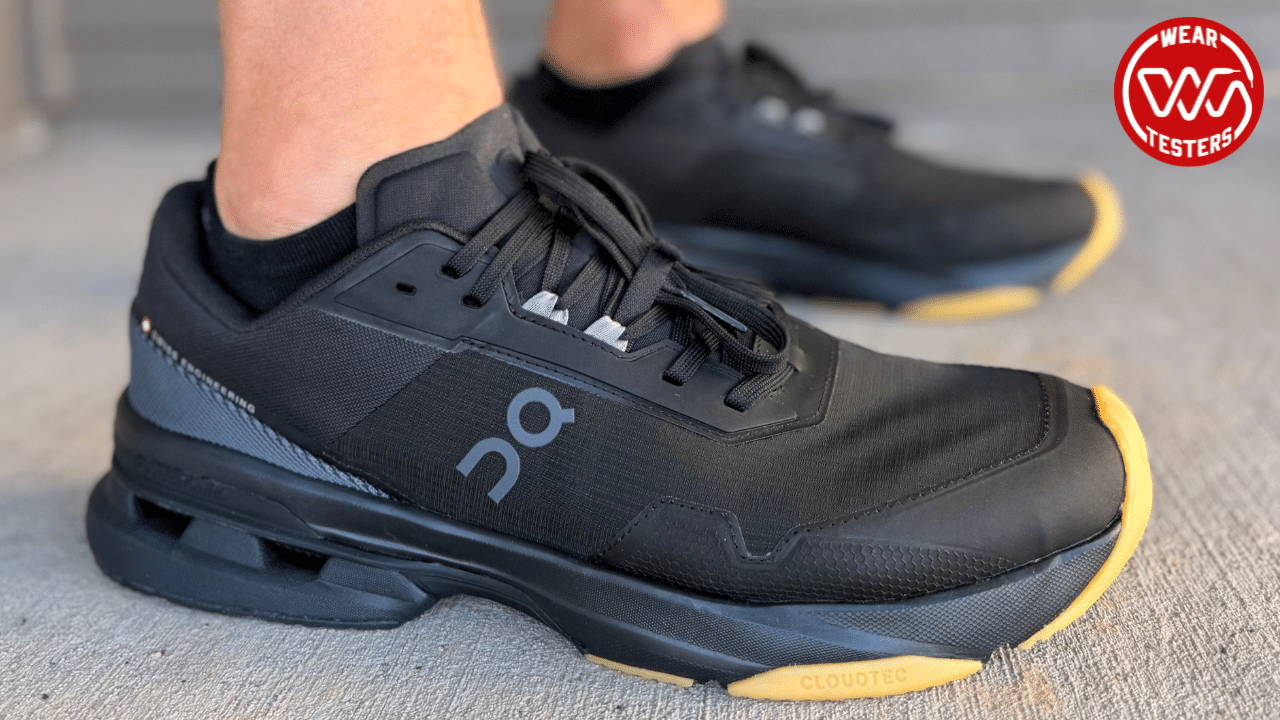The Saucony Kinvara Pro is Saucony’s first super trainer. The Kinvara Pro is a carbon-plated shoe combining two different Saucony foams with the promise of going long, fast, and everything in between…all the while saving your legs from a pounding so you can maximize your training miles. Does the Saucony Kinvara Pro achieve such lofty ambitions? Let’s find out.
Saucony Kinvara Pro
Release Date: July 2023
Price: $180
Weight: Men’s 9.5 oz., Women’s 8.5 oz.
Drop: 8mm
Sizing: True to size
- Rundown: The Saucony Kinvara Pro is a super trainer that can go fast but suffers from some upper issues and a rigid platform.
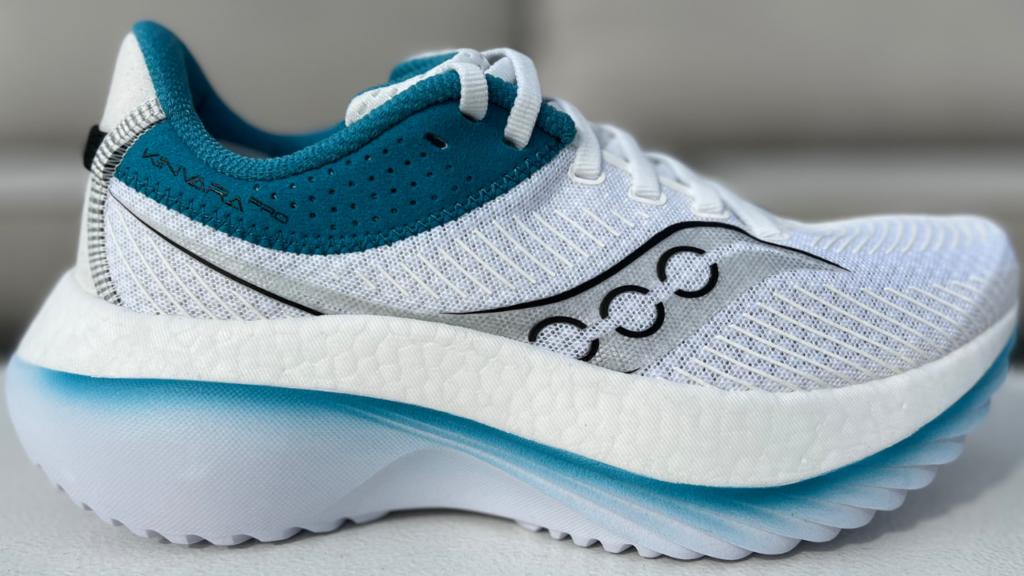
Midsole
Annie: The first thing I’ll say is that it took a solid 25-30 miles before I started to get a clear sense of the Saucony Kinvara Pro. So, be aware that you may need to invest in some getting-to-know-you-mileage to confirm how the shoe might (or might not) fit with your own running.
While the foams (that right, foams) softened up after those initial miles, the midsole is still a far cry from a mushy cushioning experience. There is a ton of dense, supportive stack underfoot (42mm in the heel and 34mm in the forefoot to be exact), and runners who often feel like shoes bottom out beneath them won’t likely find that here.
But what exactly makes up that massive stack? Well, Saucony has given the Kinvara Pro nearly every type of midsole tech in its arsenal.
Working our way from the ground up, you’ll find a layer of resilient PWRRUN foam (which doubles as the outsole), a ¾-length carbon plate, a layer of PWRRUN PB (the same “super foam” in the Endorphin Pro and Endorphin Speed 3), and a PWRRUN+ sockliner for good measure. The carbon plate also combines with the company’s signature SPEEDROLL technology—aka the rocker geometry beloved by many Saucony devotees—that’s designed to keep you rolling forward.
For some, the interplay of all those elements could produce a certain more is more harmony.
For me, the healthy stack of foams and the dense but forgiving feel they created together was nice and protective, but it was difficult to get into a rhythm with the shoe. I struggled to engage the plate, and there was a noticeable disconnect between my midfoot strike and the stiffness of the forefoot rocker.
That rigidity didn’t allow my foot to flex enough through my stride and thus kept me from being able to clear the heel stack out of my way as I normally would. So, rather than a smooth roll-through, my gait felt stilted. I could feel myself lose energy from the shoe trying to assert its rocker geometry and my mechanics trying to overcome it.
However, if I shifted my strike back toward the heel or farther up toward the forefoot, the SPEEDROLL took the reins in a manner that felt smoother and less domineering. So, depending on how you run, my experience could be either a cautionary tale or music to your ears.
The rigidity underfoot also led me to wonder if the Saucony Kinvara Pro might strike a more melodious chord with runners who benefit from a robust platform in general—whether due to their size or power. Lucky for us, we can ask our very own Viking speedster, Drew.
So, Drew, how did all that midsole tech feel to you?
Drew: As Annie predicted, the Saucony Kinvara Pro’s midsole works a lot better if you’re a larger runner. The carbon plate is stiff and the bottom layer of foam is firm. Those two layers don’t move the way you want them to unless you have a lot of power or weight behind your footfalls. My 200+ pounds came in handy to get the Kinvara Pro moving the way I wanted it to, especially when charging up a hill or completing an interval. The slower I went, the more unwieldy the outsole became.
This rings true with both Annie’s experience and others who have run in the Kinvara Pro. You need legs honed by years of running experience (i.e. you’re a high-level runner) or some weight that can push through the stiff and firm bottom layers of this midsole.
Additionally, trying the Kinvara Pro in-store can be deceiving due to the luxurious layer of PWRRUN+ right below the foot. On your first run, you’ll feel like you’re pushing through something dense. The Saucony Kinvara Pro’s midsole does break in over time, but it’s still firmer and stiffer than most other super trainers (versatile high stack, often plated running shoes).
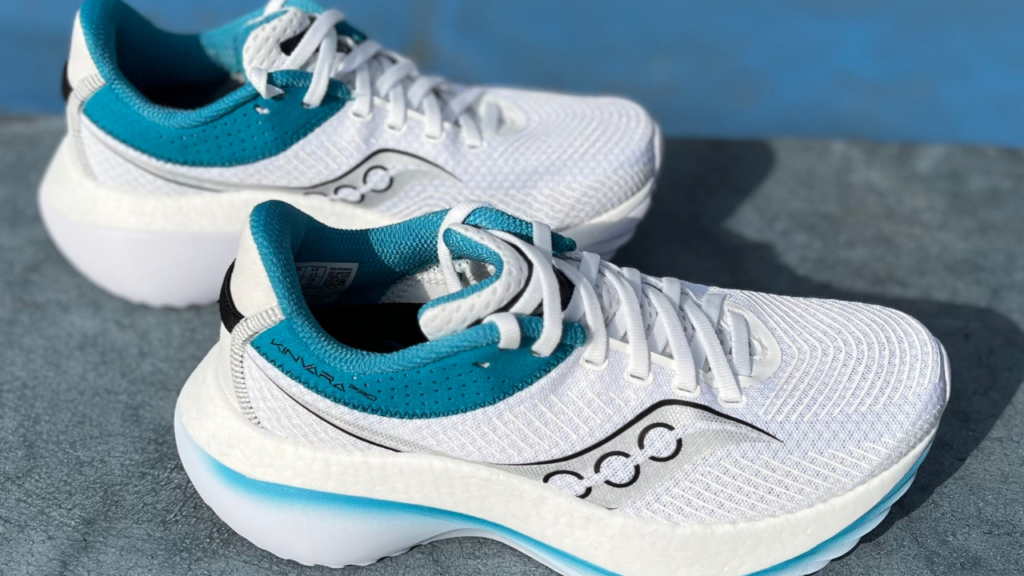
Upper
Annie: The mesh upper is nicely constructed with a gusseted tongue and a comfortable, yet not overzealous amount of padding. There’s a very flexible, suede-like material around the outside of the heel collar (note: Saucony confirms the shoe is vegan). That material also extends down the back of the heel counter, which firms up toward the bottom.
The upper is otherwise structured with lots of little overlays, but it still provided decent breathability across the variety of temperatures experienced in the Midwest this fall—which, as is their wont, have swung wildly from balmy summer to frigid winter.
The upper is well-made overall. It just didn’t happen to fit my foot very well. I ended up with extra room where it didn’t serve me and not enough room where I needed it.
For reference, I have a mostly average foot, with a slightly wider forefoot. The midfoot locked down securely, but I experienced minor heel lift even when using a runner’s knot (which was a feat to achieve, btw, due to surprisingly short laces). I suspect the shoe’s rigid platform could also be placing extra demands on the upper.
The heel lift was not so pronounced as to be insurmountable, though. The real problem for me was the fit in the forefoot. It never loosened up enough to allow my toes to comfortably splay, which seemed a bit odd for a shoe intended to cover longer distances.
I found the upper of Endorphin Speed 3 to be more flexible and more forgiving than this structured fit of the Saucony Kinvara Pro, for example. Yet the Speed 3 is still more capable of pace work than the Kinvara Pro. So, the fit struck me as incongruous.
But every foot is different. How did the upper perform for you, Drew?
Drew: I like that Annie said the rigid platform places more demand on the upper because I do think that’s true. Again, being a larger runner helped mitigate that but my upper pulled in some weird places and I got puckering along the lace line.
She also mentioned the skinny forefoot. I’m not sure what happened with the forefoot as the dimensions feel very un-Saucony-like. Saucony models usually give me plenty of room to spread my toes but that’s not the case here. I have a fairly average forefoot and can see my pinky and big toes poking ever so slightly from the sides of the upper. It’s not a big issue when walking around but it definitely is (depending on your foot) if you take the Saucony Kinvara Pro on the long distance runs its product description suggests you should.
But unlike Annie, I didn’t like the synthetic suede at the collar. The main reason is I’ve seen what happens to synthetic suede collars during sweaty summers. They get soaked and have trouble drying out. That results in the collar retaining a stinkiness that can get downright offensive. I didn’t get to try the Saucony Kinvara Pro in the summer but previous experience has taught me to be wary of this setup.
As you can see from the above, this upper needs more work to provide the type of comfort we expect from Saucony and is a rare miss for the company.
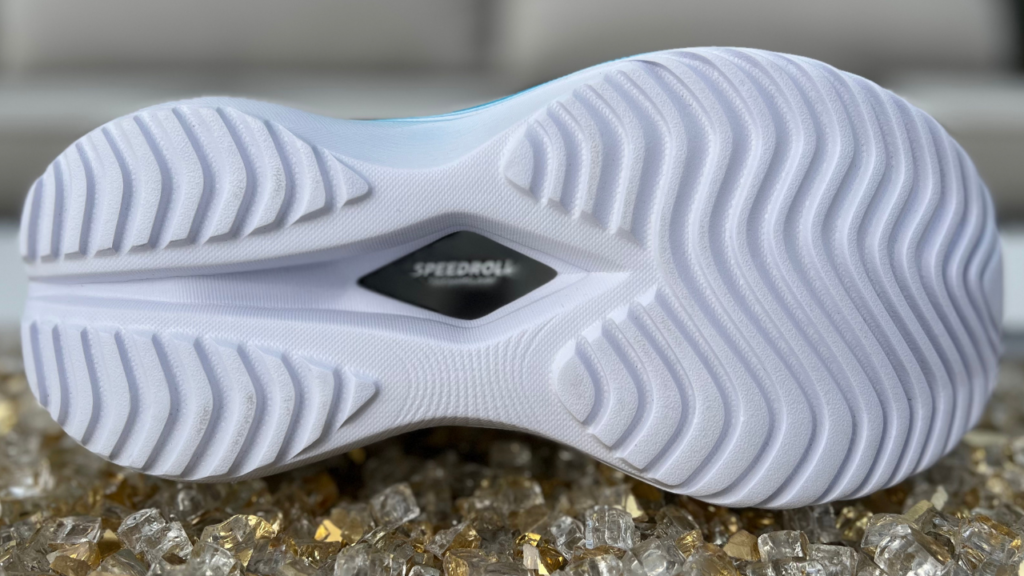
Outsole
Annie: The PWRRUN foam outsole performed okay. Dry conditions were fine, but I did get some slipping when rounding corners in wet conditions. It was difficult to feel confident and connected to the ground. I realize this is a big midsole underfoot, but I haven’t felt that way in similarly high-stacked shoes that manage to retain some flexibility. So, I think it indeed comes down to a combination of the Saucony Kinvara Pro’s pesky forefoot rigidity (I’m sensing a theme here) and, of course, its lack of rubber.
I also picked up my fair share of tiny rocks in the grooved pattern. On the bright side, they were as easy to dislodge as they were to collect. But if you regularly run over fine gravel or similar, you may find yourself hosting a small army of stowaways during your travels.
I assume going with this exposed foam traction was a weight-saving measure on a shoe that to me already runs heavier in practice than its listed weight on paper. And my pair has held up well for a shoe devoid of traditional rubber. But I’m not notorious for chewing up my outsoles. So, I do question the decision to rely on a foam outsole for a shoe meant to log loads of miles.
But let’s see how the traction held up under Drew’s typically more grueling outsole demands.
Drew: My outsole has some fraying, but not as much as I expected. The foam outsole is handling the durability portion of the testing fairly well. But as Annie mentioned, the grip is hit or miss. The Saucony Kinvara Pro wouldn’t be my choice for wet or wintry running as the traction can come and go in those situations.
I didn’t get many pebbles and rocks in the grooves of the pattern despite running a chunk of my mileage on gravel but I can see that being a problem for some depending on rock sizes where they run.
Still, the Saucony Kinvara Pro’s outsole is solid in dry conditions and durability seems on the higher end of foam outsoles. So depending on your climate, the outsole may work great for you.
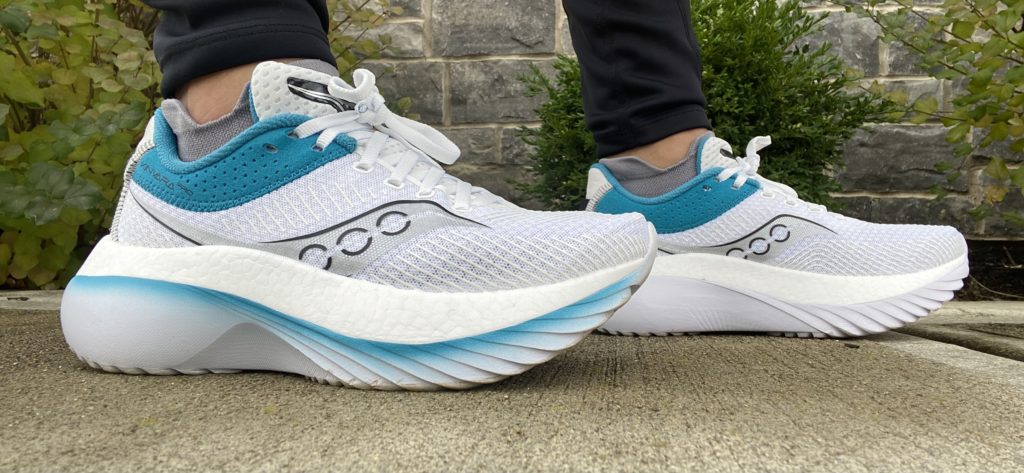
Is the Saucony Kinvara Pro wide foot friendly?
Annie: As I noted above, even my only slightly wide forefoot found the toe box a hair too slim. The shape tapers in too soon on the lateral side for my pinky toe’s liking, and the upper doesn’t have much give. Saucony does offer a wide version of the Kinvara Pro, and I’d say that’s probably the best bet for true wide footers who want to give the shoe a try. Given the fact that I didn’t get the best heel lockdown in the standard width, though, getting the fit just right may require a bit of trial and error for some.
Drew: Even with a wide version of the Saucony Kinvara Pro available, the slim toe box shape is going to prevent most, if not all, wide footers from enjoying it. Despite its true-to-size fit, I’m inclined to only recommend this shoe to larger narrow-footed runners who won’t have issues with the toebox or the midsole.
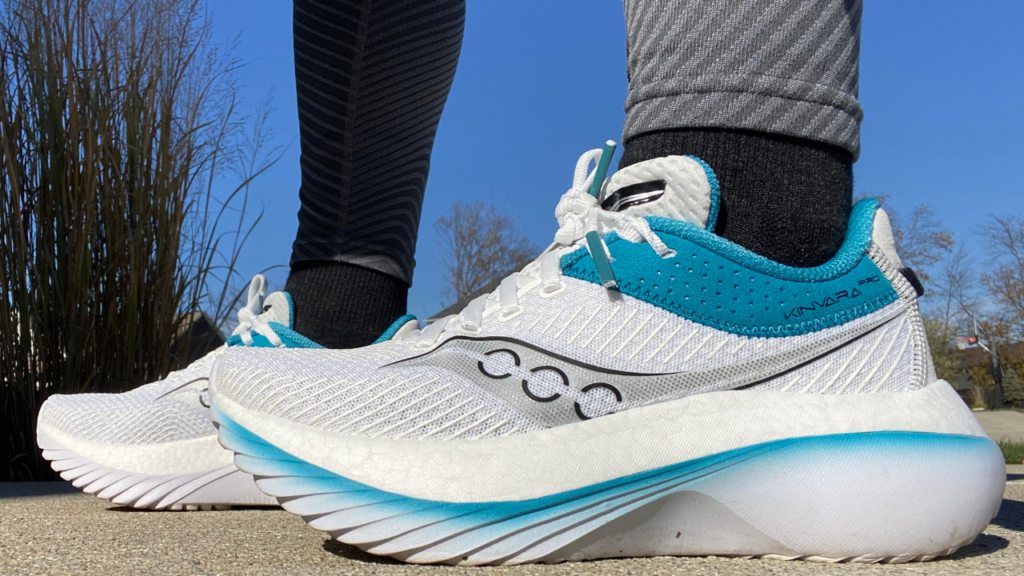
Is the Saucony Kinvara Pro worth $180?
Annie: I think the Saucony Kinvara Pro could be worth $180 to a very specific runner. That runner would need to have a strike that agrees with a sturdy rocker and probably an average-to-narrow foot (unless Saucony’s wide sizing usually works for them). Perhaps they’ve also not gotten along with plated shoes in the past due to the compression or instability of the foams typically used in them and instead need a plated shoe with a more substantial platform. If that’s you, $180 is in the ballpark for this category.
Personally, as a runner who loves the protective stack of the Saucony Kinvara Pro but can’t get past its rigid rocker and fit, $180 looks steep. I can simply get more versatility and a more natural running experience in general from other “super trainers” for a similar price.
But, Drew, what’s your take as someone who is not only bigger, taller, and faster, but who has also run in just about all the Saucony Kinvara Pro’s direct competitors?
Drew: I think Saucony priced the Kinvara Pro based on the idea of the Kinvara Pro. A plated workhorse that could go long or fast when you need extra cushion underfoot (similar to the value prop of both the New Balance SC Trainer v2 and Asics Superblast). Unfortunately, $180 is a bit steep considering the issues with the upper and narrow set of people that can really make the midsole work for them. If it had delivered on its promise, $180 would be perfect but as currently constructed it’s hard to justify the price without using a coupon.
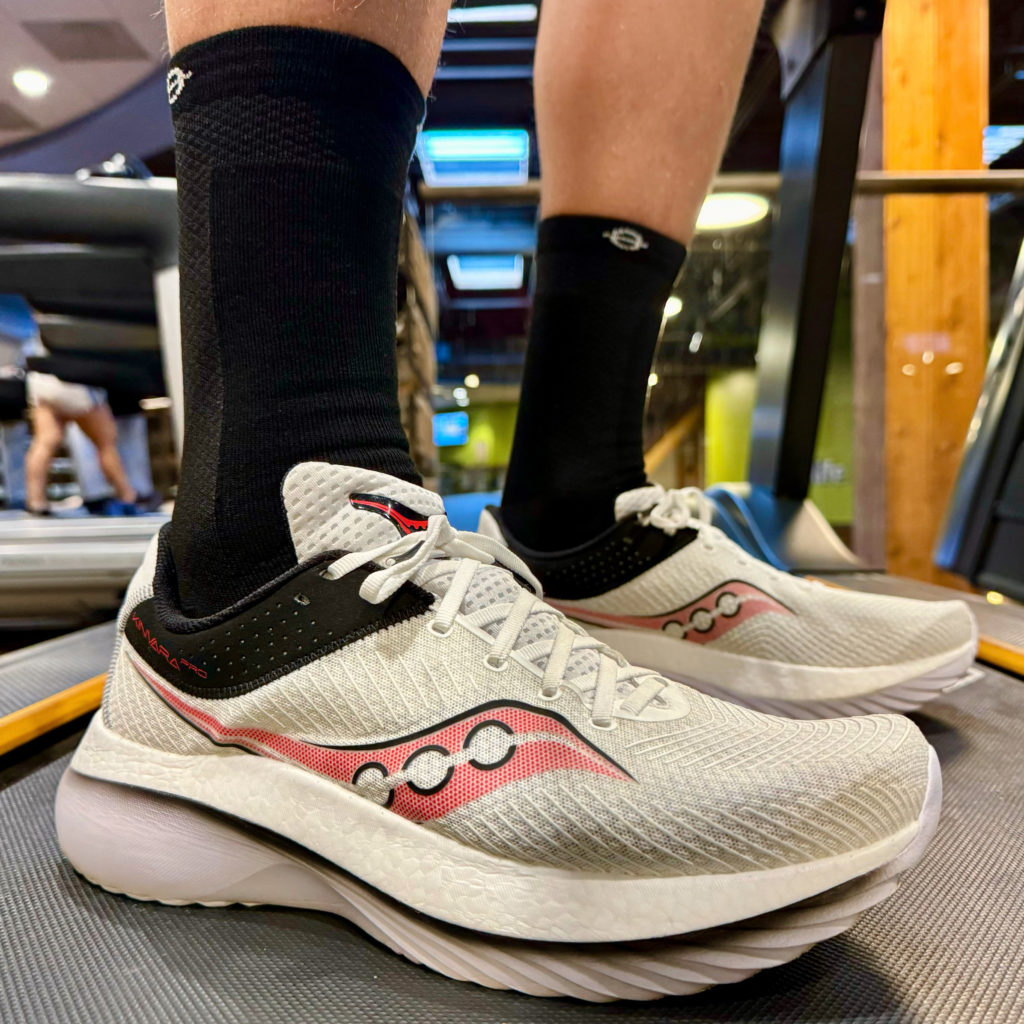
Saucony Kinvara Pro Summary
Annie: The Saucony Kinvara Pro is a tough sell for me, as I don’t think it’s the best option for any singular use case or the best generalist out there. But for the average-to-narrow-footed runner who vibes with a sturdy rocker, wants a carbon plate in their daily driver, and loves a hearty stack of not one, not two, but three different foams, the Saucony Kinvara Pro will offer plenty of impact protection for those long, steady efforts.
Drew: Annie said it best, the Saucony Kinvara Pro will work well for larger runners with narrow feet. Other than that, you’re going to have better options. Check out our list of best long distance running shoes to see the shoes we prefer in this category.

